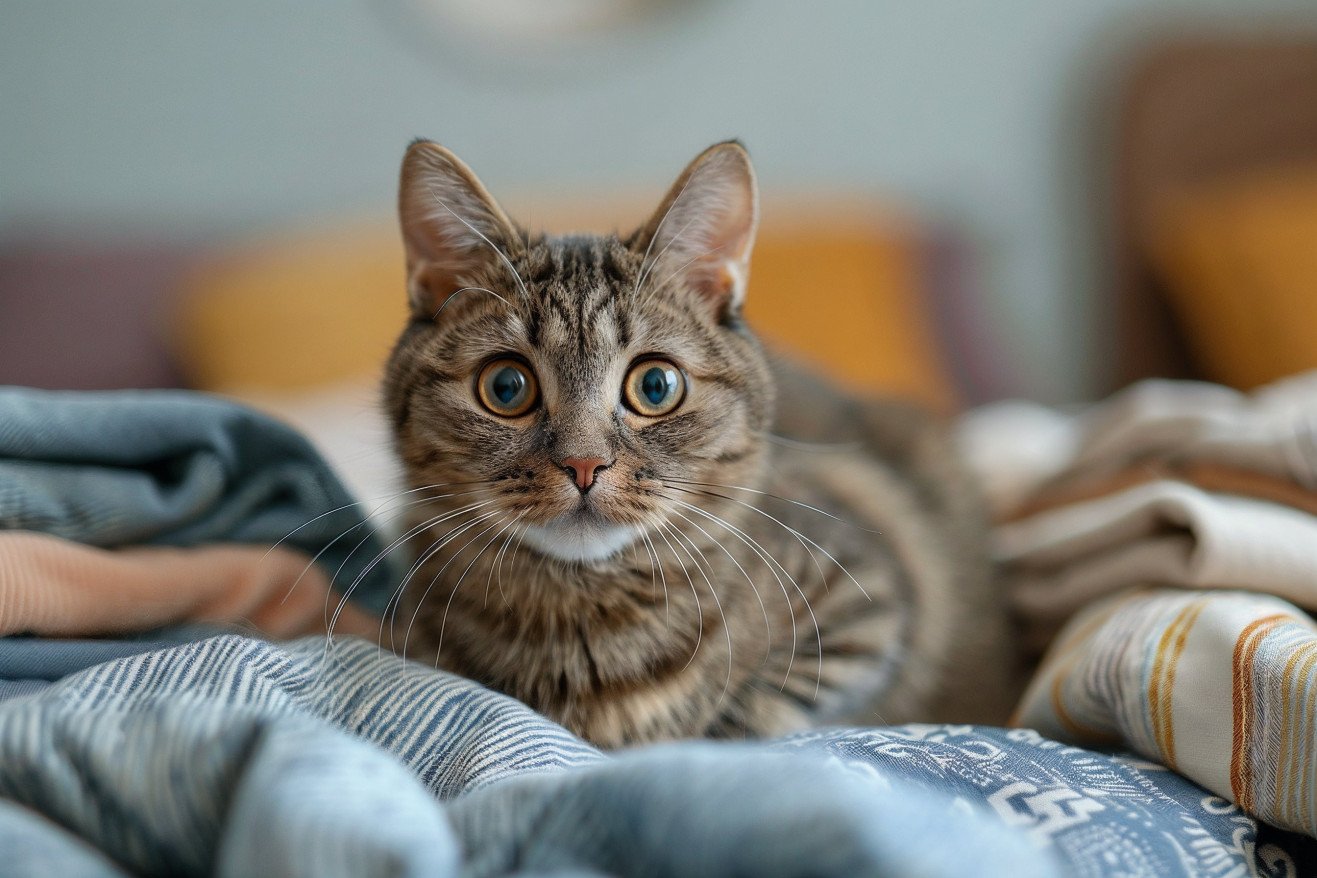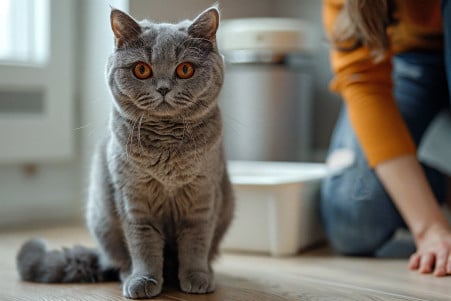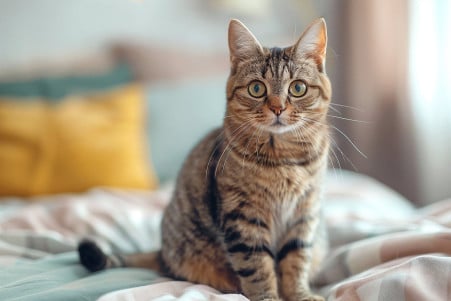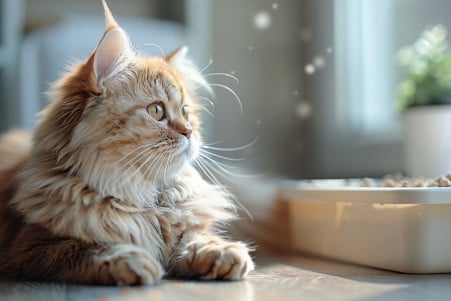Why Does My Cat Pee on My Clothes? Exploring Feline Behavior
20 February 2024 • Updated 19 February 2024

When you find out that your cat has used your clothes as a bathroom, it can be shocking and annoying. Cats may pee on clothes due to medical issues like UTIs or diabetes, stress, anxiety, or litter box aversion. Make sure you keep the litter box clean and look out for any medical problems. Changes in behavior or stressors in your cat’s environment may also lead to this kind of marking.
We will explore a variety of research in the fields of veterinary science, animal behavior, and domestic animal psychology to get a better understanding of the many factors that contribute to this feline behavior. Our exploration will include medical conditions, behavior trends, and environmental influences that play a role in these behaviors.
By the end of this article, you will have a better idea of what could be causing your cat’s behavior and you’ll have some actionable steps to take to get your home back to normal.
Why does my cat pee on my clothes?
Dealing With the Health Issue: Medical Reasons for Feline Inappropriate Urination
If your cat is peeing on your clothes, it could be a sign of a medical issue. Urinary tract infections (UTIs), diabetes, and kidney diseases are all known to cause a cat to pee outside of the litter box. According to Dr. Laura Monahan of Atlantic Vet Seattle, other medical issues like UTIs, crystalluria, bladder stones, and feline lower urinary tract disease (FLUTD) can also cause your cat to pee on your clothes.
Dr. Ashley Darby BVSc stresses that it’s important to get your cat to the vet as soon as possible to get a diagnosis and treatment for these medical issues. Catching these medical issues early can prevent chronic behavioral issues and more severe health problems. Regular monitoring for signs of medical issues, such as changes in urination frequency, volume, or pain, as well as regular vet check-ups, are important for maintaining your cat’s urinary health.
By learning to see your cat’s behavior as a cry for help rather than a sign of disobedience, you can find more compassionate solutions. As we’ve learned more about their behavior, we’ve also learned about the importance of their environmental needs and stress, which are also important factors in your cat’s overall health.
What Causes Stress and How It Affects Your Cat
Stress and anxiety have a big impact on people and cats, and can even cause cats to pee on your clothes. One study published in the Journal of Veterinary Internal Medicine found that environmental stressors, such as moving or adding new pets to the household, were associated with changes in cats’ elimination behaviors.
Another study published in Frontiers in Psychiatry found that the stress response in cats is mediated by the central threat response system, which can lead to changes in normal behaviors, including litter box use, when it’s activated.
A study published in PMC found that stress in cats is made worse by environments that lack predictability and control. Therefore, it’s important to recognize and change stressors in order to prevent inappropriate urination.
Reducing stress and increasing proper litter box use can be helped by adding environmental enrichment and maintaining a regular schedule. It’s also important to recognize and respond to a cat’s behavioral cues, as these are their primary means of communication. By providing a stable environment that recognizes these subtle signals, cat owners can help ensure their pets’ mental health and prevent unwanted urinary accidents.
Solving the Mystery of Litter Box Aversion: How to Help Your Cat Love Their Loo
If your cat is avoiding their litter box, they may be experiencing litter box aversion, which can lead to them using less appropriate placeslike your laundryas a bathroom.
So, what causes litter box aversion? According to Fear Free Happy Homes, one of the most important factors in a cat’s bathroom satisfaction is the location of the litter box—secure and away from loud sounds, but still easy to access.
Meanwhile, the American Animal Hospital Association’s (AAHA) General Litter Box Considerations explains that a cat’s willingness to use the litter box is heavily influenced by the cleanliness of the box and the type of litter inside. In fact, cats often have a litter preference, and many seem to prefer unscented, clumping litters.
In multi-cat households, both Fear Free Happy Homes and the AAHA guidelines suggest that providing an appropriate number of litter boxes—one for each cat, plus one extra—can help reduce stress and competition.
To make the litter box more attractive, make sure it’s large enough, easy to get into, and kept clean to meet your cat’s high standards.
Finally, don’t forget that medical issues can cause litter box aversion, so it’s important to see a vet to rule out medical problems. By making these thoughtful changes, your cat’s instincts should lead them back to their preferred digging spot, leaving your laundry alone and your bond intact.
Cat Territorialism: The Science Behind Inappropriate Urination
Cats’ territorialism is an instinctual part of their nature, and urine marking is a natural and necessary way for them to communicate. This is a cat’s way of marking its territory, establishing dominance, and communicating with other cats.
A study in PubMed explains that these instincts are inherited from their ancestors, and the need to protect territory often outweighs the importance of social relationships. This territorialism can lead to urine marking inside and outside of the home.
The social structure of cats plays a big role in marking behavior. Social dynamics between cats in the same household or between indoor cats and outdoor cats can lead to territorial conflicts, which cats deal with by urine marking, according to Veterinary Partner.
To help reduce territorial stress and inappropriate marking, cat owners should make sure that each cat has a strong core territory, especially in homes with multiple cats. Veterinary Partner recommends that cat owners help protect this territory by making sure that the space is calm and enriched and that litter boxes are kept clean and are easily accessible.
In addition, having cats spayed or neutered can help reduce the likelihood of territorial marking, especially if the marking is due to mating-related behaviors.
By making sure that a cat’s environmental and social needs are met, cat owners can help discourage inappropriate marking and help their pets feel secure, which can lead to a more peaceful coexistence between cats and their human family members.
Cracking the Cat Code: Communication Gaps and Inappropriate Elimination
Good communication is key in any relationship, including the one between cats and their human companions. Yet, communication gaps can leave cat owners scratching their heads when they find their favorite feline has peed on their favorite sweater.
Cats communicate in a variety of ways, and as a result, a study in Animals (Basel) found that cats are sensitive to both visual and bimodal cues, which can impact their behavior. In addition, “PMC” notes that cats can pick up on and respond to our emotional cues, which can impact how they behave and interact with us.
To help close these communication gaps, it’s important to understand the nuances of cat communication, including the slow blink, which is the focus of a study published in Scientific Reports. This type of communication indicates trust and comfort and can help close the communication gap.
Socialization is also important, as the way cats communicate with humans is shaped by their early experiences. By learning to better understand these forms of communication, we can help reduce the chances of cats using urination as a form of communication and strengthen the bond between cats and their human companions.
Putting It All Together: Why Does My Cat Pee on My Clothes?
We’ve delved into the many reasons why a cat might pee on their owner’s clothes, from medical causes to behavioral and environmental ones. From the pain of Feline Lower Urinary Tract Disease (FLUTD) and the symptoms of kidney diseases to the mental health issues of stress and anxiety, the causes are many and complex.
We’ve also explored the appeal of soft laundry to cats, the many ways cats communicate with their humans, and the importance of a clean litter box.
This investigation shows why it’s important to take a comprehensive approach to understanding and treating a cat’s inappropriate elimination. As Catster points out, pet parents should pay attention to their cats’ behavior and take them to the vet if they notice any changes.
Let’s end with a reminder to have compassion for our cats, who are often acting out of their own needs even when their behavior is frustrating. By responding to these issues with understanding, love, and knowledge, we can make our relationships with our beloved pets even better.


